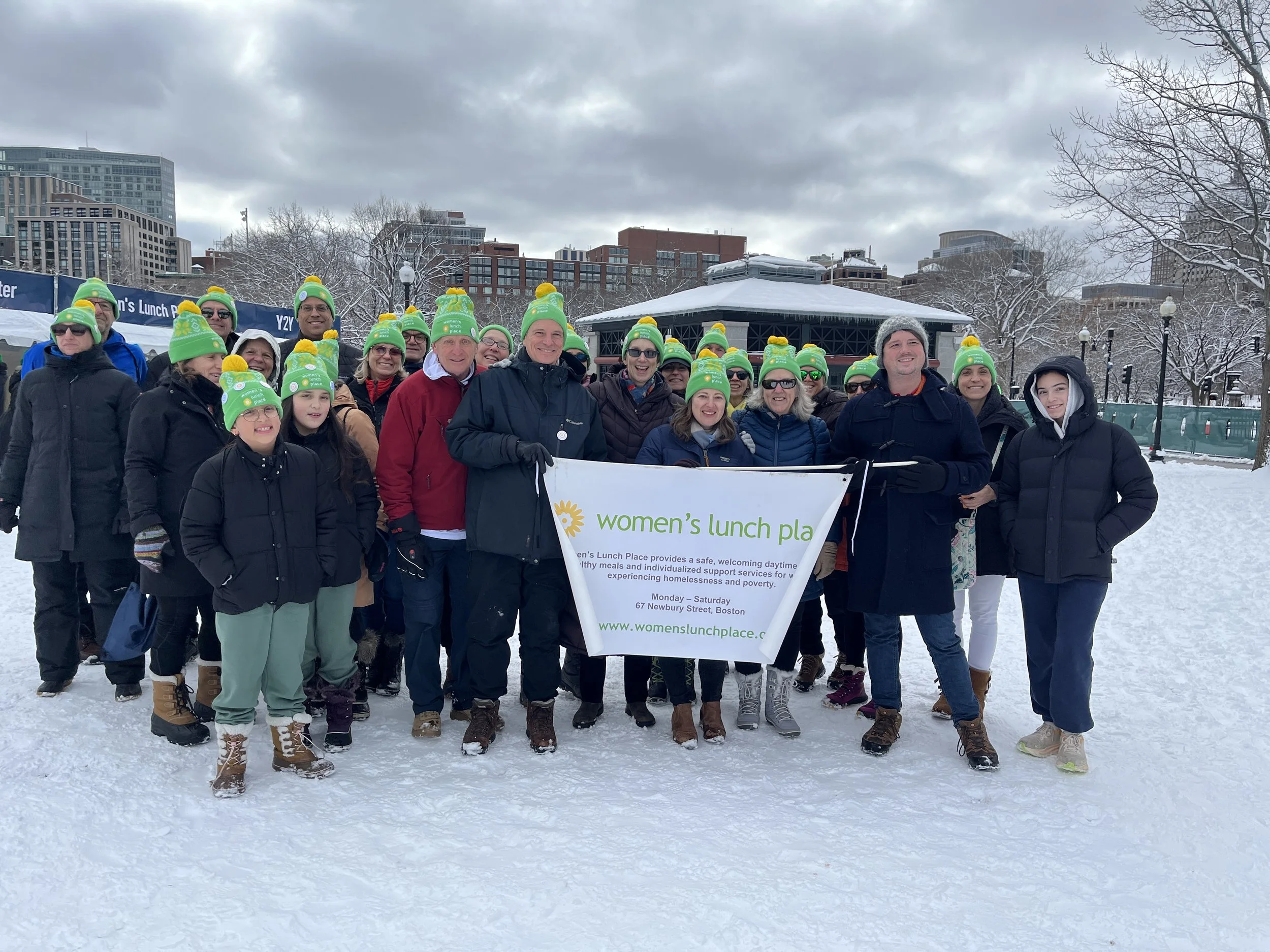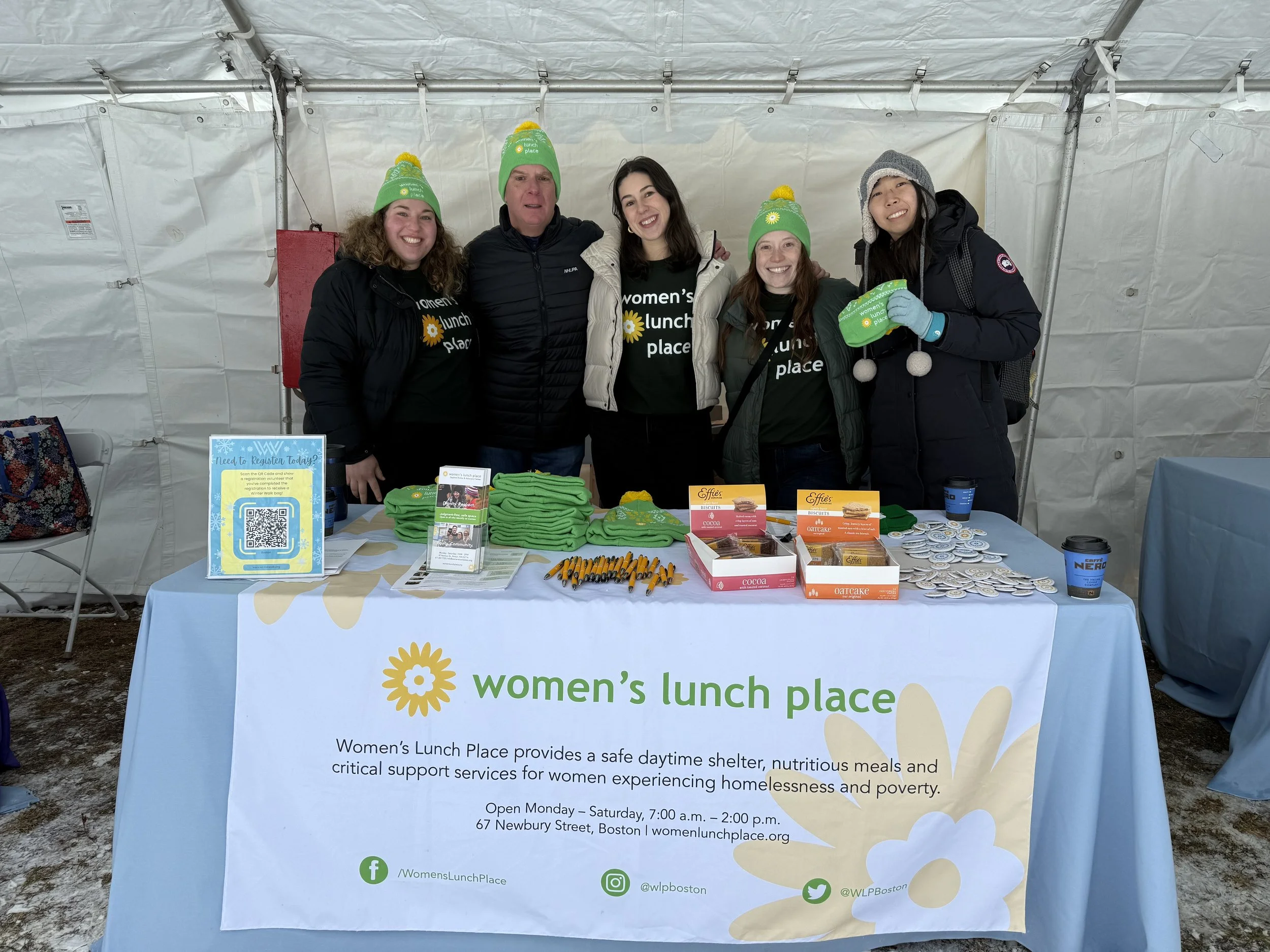Ending Homelessness with Women’s Lunch Place Boston
Winter Walk is proud to support the work done by our Organizational Partners (OPs), the service providers administering aid to the unhoused people that live in the cities we walk in 365 days a year. Winter Walk gives 100% of the funds raised at our Walk Events to our OPs; with walks in Boston, Chicago, New York, Philadelphia and Tallahassee, we’re on a mission to grow our walk program nationally. Learn more about becoming a Winter Walk OP here.
Women’s Lunch Place
Boston, MA
womenslunchplace.org
The Winter Walk team recently had the pleasure of interviewing members of the incredible team at Women’s Lunch Place, located at 67 Newbury Street in Boston, to learn more about their work and commitment to the unhoused communities in our city.
Could you please tell our readers about Women’s Lunch Place?
Women’s Lunch Place (WLP) is a daytime shelter for women experiencing homelessness and poverty in Greater Boston. We build trusting relationships and provide services focused on nutrition, health, housing, and economic empowerment.
Offered alongside our healthcare and housing programming, the ‘Healthy Meals’ program at WLP is our foundational offering. Guests are provided three meals per day with breakfast and lunch served restaurant-style, brought to guests seated at tables, and a third meal is offered through the Takeaway Dinner program. Not only are women’s nutritional needs met but it is also done in a way that restores their dignity and offers a chance to build connection with other guests over a warm meal.
Your commitment to dignity is something that we know resonates with a lot of our community members, and your ‘Healthy Meals’ program is so touching, and unique - we’ve never heard of meal service quite like it. And the smiles on the faces of both your guests and your volunteers says it all! How many people does WLP serve?
Figure 1. WLP Guest Population by Race
Women’s Lunch Place annually serves over 2,200 self-identifying women experiencing homelessness and poverty across Greater Boston, primarily from the Suffolk, Middlesex, Essex, and Norfolk counties. Guests at WLP are ethnically and culturally diverse, as shown in Figure 1, including immigrants from around the world.
Most of the women served by WLP live in neighborhoods that are most affected by healthcare, racial, and gender disparities. Some guests stay in emergency shelters, where beds for women are limited, while others choose to spend their nights outside, often due to distrust of these institutions based on past events. On the other hand, many guests are insecurely housed, having to make the impossible choice between rent and necessities every day.
Figure 2. Guest Challenges and Support Needs
| Guest Challenges and Support Needs | Percentage of Guests at WLP |
|---|---|
| Rely on WLP for most of their meals | 64% |
| Over the age of 50 | 67% |
| Experiencing homelessness | 57% |
| History of trauma or violence | 69% |
| Mental health challenges | 78% |
| Unemployed | 77% |
According to WLP’s data, 35% of the women they served last year were first-time guests, which reflects the rising number of unhoused women in Greater Boston. That level of turnover creates instability for a population already facing intersecting vulnerabilities. For example, many suffer from debilitating mental illness, are struggling with or recovering from substance use disorders, or have chronic and/or acute physical ailments. These additional statistics, shown in Figure 2, reveal a population in crisis and highlight the strength of WLP’s community.
WLP is more than a daytime shelter - it’s a community. The organization works intentionally to build trust and foster a sense of belonging, meeting women where they are at, and adapting to their evolving needs. That said, the women who visit WLP are resilient in the face of their daily challenges, bringing joy, kindness, and their own talents and personalities to the space. Whether it’s performing in the WLP’s talent show, encouraging one another to join activities, or simply offering a quiet gesture of support, guests contribute to an environment of deep care and understanding. Together with staff and volunteers, they form the unique and diverse community of Women’s Lunch Place.
35% increase in first time guests - we’re hearing that from so many of our organizational partners, as the number of unhoused people has increased nationally year over year. We are so eager to help you increase fundraising to allow you to continue to serve this community. You’ve been with us since our first Winter Walk in 2016 and received an amazing $34,500 from this year’s Walk Event. How will you be using those funds this year?
Funding from Winter Walk 2025 will support WLP’s holistic programs for women in need, including Healthy Meals, Direct Care, Advocacy, Healthcare, and Wellness.
Staff and participants in Boston Common during the 2025 Winter Walk
Staff and participants posing in the WLP Booth at the 2025 Winter Walk
What are the greatest needs Women’s Lunch Place has in 2025?
WLP’s greatest need in 2025 is to expand and advocate for gender-specific services that address the unique experiences of women facing homelessness. Studies show that 90% of homeless women have experienced trauma: rape, trafficking, childhood abuse, and intimate partner violence which is the leading cause of women’s homelessness. These experiences deeply impact mental cognition, physical well-being, and the ability to build trust. Unhoused women also face higher rates of diagnosed mental health conditions, suicidal thoughts and attempts, and childhood trauma compared to their male counterparts, resulting in unique needs that are often unmet by standard services. Evidence suggests that women with histories of violence and co/tri morbidities are likely to experience a crisis before recovery.
WLP excels in trauma-informed crisis intervention, developing tailored solutions and recovery plans that address the specific needs informed by each woman’s trauma history. This approach supports agency, safety, and proactive crisis planning. With homelessness rising 67% in Greater Boston last year, the need to scale gender-specific services has never been more urgent.
What is something you wish everyone understood about homelessness?
The way that women experience homelessness is fundamentally different. Services that ignore gender-specific trauma often fail to address the core challenges these women face. Many have histories of violence which profoundly affect their sense of safety and trust. Successful intervention and services need to be tailored according to each woman’s life experience and unique needs.
What is something you wish everyone knew about unhoused people?
Homelessness doesn’t look one way and those experiencing homelessness come from a variety of backgrounds. WLP serves women from different ethnicities and races, socio-economic backgrounds, and education levels. Some women come from generations of poverty and are chronically homeless while others have college degrees and are in crisis for many reasons ranging from divorce, domestic violence, forced retirement and/or mental health issues. What they have in common is not a single background, but a shared experience of crisis and resilience. Recognizing this diversity helps break stigma and encourages more compassionate, effective support.
How can people help Women’s Lunch Place?
Whether you’re an individual, a group, or an organization, there are many ways to get involved with WLP’s work. Opportunities to support women in need at WLP can be found here: https://womenslunchplace.org/support
Thank you so much for your time and we can’t wait to walk with you again on Boston Common in February!
Winter Walk is a nonprofit on a mission to end homelessness in America. Winter Walk hosts walk events in major cities across the United States designed to raise funds for local service organizations while building community between housed and unhoused people, and offers educational services to the public designed to eliminate the stigma associated with homelessness. At a time when homelessness is increasing across America, Winter Walk believes that ending homelessness is within our reach – and it starts with ending stigma. Winter Walk uplifts the voices of those who have experienced homelessness, breaking down negative images and stereotypes through storytelling, education, and community building. Learn more about our mission.







